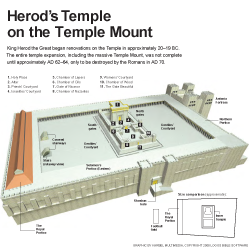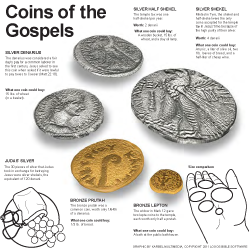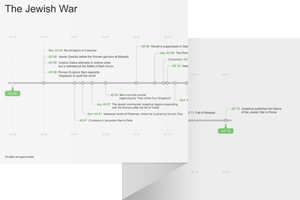11:1–11 As Jesus enters Jerusalem on a colt, many gather to bless Him and hail the return of the Davidic kingdom (compare 2 Sam 7; note on Mark 10:47). The scene is reminiscent of a triumphal, kingly procession, but Jesus does not proceed to act like an earthly king—He does not take military action against occupying Rome or Herod Antipas (compare 6:14). Neither the religious leaders nor the Romans seem to take note of Jesus’ entry into Jerusalem until Jesus cleanses the temple (vv. 15–19). |
11:1 Bethphage A village on the eastern outskirts of Jerusalem.
Bethany One of Jerusalem’s outlying settlements.
Mount of Olives A two-mile-long ridge that forms Jerusalem’s eastern border and rises about 300 feet above the city; a site of many olive groves. In the book of Zechariah, the Mount of Olives is the place where God’s glory is revealed (Zech 14:1–7).
is the place where God’s glory is revealed (Zech 14:1–7).
11:2 colt Reflects the ot image and prophecy of Jerusalem’s king riding on a donkey (see Zech 9:9 and note; compare 1 Kgs 1:38 and note).
on which no one has ever sat Probably an allusion to Zech 9:9, which describes the king’s mount as “new.”
11:3 The Lord This instance of the Greek term, kyrios, is likely the common usage to refer to a social superior, meaning something akin to “teacher” or “sir.”
11:5 Kings were known to enter cities in splendor, especially during coronation or after a victorious battle. They may have ridden a chariot pulled by four horses or even elephants and been accompanied by troops. While Jesus does enter as king, His approach is humble—He is not accompanied by soldiers and rides on a borrowed colt. This not only emphasizes Jesus’ humility as king, but also reflects the nature of the kingdom of God (compare Matt 21:10 and note). |
11:8 many people spread their cloaks on the road A public declaration of political allegiance (compare 2 Kgs 9:13). Jesus enters Jerusalem as its king, and the people accept Him as such.
branches A common element in festal processions (Lev 23:40).
11:9 were shouting They shout an adaptation of Psa 118:25–26, which commemorates God’s victory over foreign armies through His agent (presumably the Davidic king).
Hosanna A transliteration of the Hebrew phrase hoshi'ah na, which means “save us!” Compare Psa 118:25.
Blessed is the one who comes A quotation of Psa 118:26. This announcement happens in response to a display of God’s favor (Psa 118:27).
11:10 coming kingdom of our father David Reflects the expectation that the kingdom of David would be restored to Israel, involving someone from David’s line sitting on the throne and the restoration of Israel (see note on Mark 10:47).
in the highest Refers to the heavens and their inhabitants (compare Psa 148:1–4).
11:11 he went into Jerusalem to the temple This reflects the prophecy of Mal 3:1 (compare Mark 1:2). See note on Matt 21:10.
he went out to Bethany with the twelve An unexpected conclusion to the fanfare that accompanied Jesus’ arrival.
11:12–14 Jesus curses a fig tree that bears no fruit, symbolizing the fruitlessness of Israel—especially its religious leaders—and the judgment His ministry brings. |
11:13 fig tree Israel is frequently compared to a fruitless fig tree in ot prophetic literature (e.g., Jer 8:13; Mic 7:1).
11:15–19 Jesus’ cleansing of the temple enacts His implied judgment on Israel’s corrupt religious system (Mark 11:12–14). This act also is consistent with His messianic mission of restoring true religion and right relationship to God. |
11:15 who were selling and those who were buying The vendors likely were selling animals designated for sacrifice. To be fit for sacrifice, an animal had to be free from illness and physical defect (e.g., Lev 1:3; Mal 1:8). Many people preferred to purchase the animal inside the temple courts—especially during pilgrimage festivals, when thousands of people were around.
tables of the money changers Monetary exchange was necessary because all contributions made at the temple had to be rendered in a uniform currency (the Tyrian shekel).
11:17 a house of prayer for all the nations Jesus quotes Isa 56:7, part of a declaration about the importance of justice and covenant observance.
a cave of robbers Jesus quotes Jer 7:11, part of an indictment of the people of Judah for injustices they committed against God and neighbor.
11:18 chief priests Refers to the leading members of the priesthood, who were responsible for the operation of the Jerusalem temple. They also played an essential role in mediating Roman rule.
the scribes Depicted as associates of the chief priests in their plot to kill Jesus (e.g., Mark 14:1). See note on 1:22.
11:20–25 The fig tree that Jesus cursed (vv. 12–14) has now withered. The disciples ask Him about it, and He responds by teaching about faith, prayer, and forgiveness. |
11:23 this mountain Jesus may be referring to a specific mountain visible to His disciples—likely the Mount of Olives or the Temple Mount.
11:27 the elders Represents the Jewish aristocracy of Jerusalem or a governing body.
11:28 By what authority Those who question Jesus are likely aware of Jesus’ Davidic association; His triumphal entry into Jerusalem was a public assertion of authority.
these things Probably refers to Jesus’ actions in this temple.
11:30 The baptism of John Although Jesus does not answer the question directly, His response alludes to the source of His authority: It is the same source that legitimized John’s ministry.

|
About Faithlife Study BibleFaithlife Study Bible (FSB) is your guide to the ancient world of the Old and New Testaments, with study notes and articles that draw from a wide range of academic research. FSB helps you learn how to think about interpretation methods and issues so that you can gain a deeper understanding of the text. |
| Copyright |
Copyright 2012 Logos Bible Software. |
| Support Info | fsb |
 Loading…
Loading…

 Mount of Olives
Mount of Olives 

